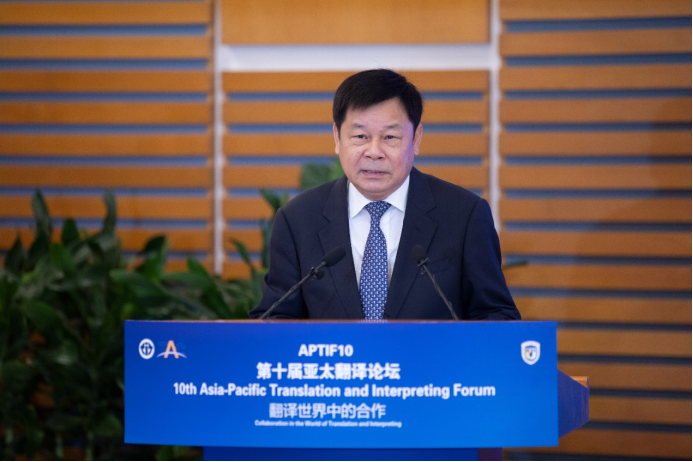Translation promotes communication by crossing languages, cultures
- By Xu Xiaoxuan and Zhang Jiaqi
 0 Comment(s)
0 Comment(s) Print
Print E-mail China.org.cn, June 26, 2022
E-mail China.org.cn, June 26, 2022
In today's globalized and information-oriented world, translation and interpreting have effectively enhanced friendly exchanges and mutual trust among countries, as well as promoted world peace, development and the common progress of humanity, underlined Du Zhanyuan, president of the Translators Association of China (TAC) and China International Communications Group (CICG).

Du made the remarks at the 10th Asia-Pacific Translation and Interpreting Forum (APTIF), which opened in Beijing on June 25 with the aim of providing a platform for communication and cooperation for the translation community in the Asia-Pacific region.
Bridging linguistic and cultural gaps
In international communication, translation enables information to spread accurately, quickly and widely, thus playing an important role in enhancing trust and dispelling doubts, Du said, adding that he hopes the translation community in the Asia-Pacific region can work to remove barriers between different languages and build bridges between diverse cultures to promote prosperity and development in the region.

Gao Anming, chair of the APTIF Joint Committee, executive vice president and secretary general of TAC, vice president and editor-in-chief of CICG, and council member of the International Federation of Translators (FIT) echoed Du's remarks, saying that translation is becoming a bridge for promoting cultural communication, economic and trade exchanges, knowledge sharing and social progress.
Professor Li Yuming from Beijing Language and Culture University expressed similar views, along with a belief that language constructs, interprets and records culture. "Language is also a medium for cultural communication and transmission," Li said. "The mission of translation is to promote accessibility in communication, and exchange knowledge between community A and community B, and eventually turn it into knowledge shared by all humanity."
Making translation and interpreting more intelligent and efficient

FIT President Alison Rodriguez commented that translation and interpreting skills are no longer just language skills — although these are still the most important strength, translators and interpreters should also "excel in technical skills," which can help understand the purpose, process, complexities and nuance of the relevant work.
Du Zhanyuan also emphasized the importance of using new technology in translation. "In recent years, the continuous development of artificial intelligence (AI), big data, cloud computing and other new technologies has provided new impetus to translation. I hope that the translation community of the Asia-Pacific region will closely follow the development trends of translation technology, strengthen the construction of translation technology platforms such as AI-assisted translation systems, create new application scenarios and models, and deepen technical cooperation to advance the translation industry to a higher level of digital and intelligent application."
The importance of technology in translation was also reflected by Gao Anming, who pointed out that technological advancements have empowered translation and interpreting activities, injecting vitality into the industry. "People with business foresight and tech savvy entrepreneurs are eager to harness new technologies and apply 'internet plus'-thinking to the language service industry and have hence opened a vast ocean for language technologies to help build both a more globalized and localized future."

Professor Lynne Bowker from the University of Ottawa in Canada looked back at some of the major twists and turns in human-computer collaboration in the context of machine translation, and considered how to get the most out of human-computer cooperation in the age of neural machine translation.
Cooperation guiding translation and interpreting activities

Professor Yang Dan, president of Beijing Foreign Studies University (BFSU), noted that cooperation is the principle guiding all types of translation and interpreting activities. "From a small task to a country's translation strategy and the translation function of the United Nations and other international organizations, cooperation is a must."
Yang elaborated that different roles are needed and coordinated to accomplish various tasks, whether it is the translation of the Bible in the West or the Buddhist sutras in China in the past, or the language services during the COVID-19 pandemic in modern times.
Professor Ji-Hae Kang from Ajou University of the Republic of Korea echoed the view regarding the specific basis of audiovisual materials.
Kang said that collaborative translation work is indispensable in the streaming age with the rising popularity of such platforms as Netflix, YouTube, iQIYI and Tencent Video, and motivated by the needs for speedy translation, quality control and to fulfill new functions related to increasing the economic value of media products.
According to Kang, the translation of audiovisual materials can increase linguistic and cultural diversity within the media landscape, especially for languages and cultures that have previously received little attention in the global media industry, thereby potentially decentralizing the existing hierarchy in the media system and diversifying cultural flows.
Professor Ren Wen from BFSU explained that a country's translation capacity (NTC) is positively correlated with its economic hard power and cultural soft power. She concluded that cooperation is needed between NTC-related stakeholders and decision-makers to enable more and better contribution of NTC to a country's economic and cultural development.
The forum is being hosted both online and in-person by the International Federation of Translators and the Translators Association of China, and organized by Beijing Foreign Studies University.






Go to Forum >>0 Comment(s)